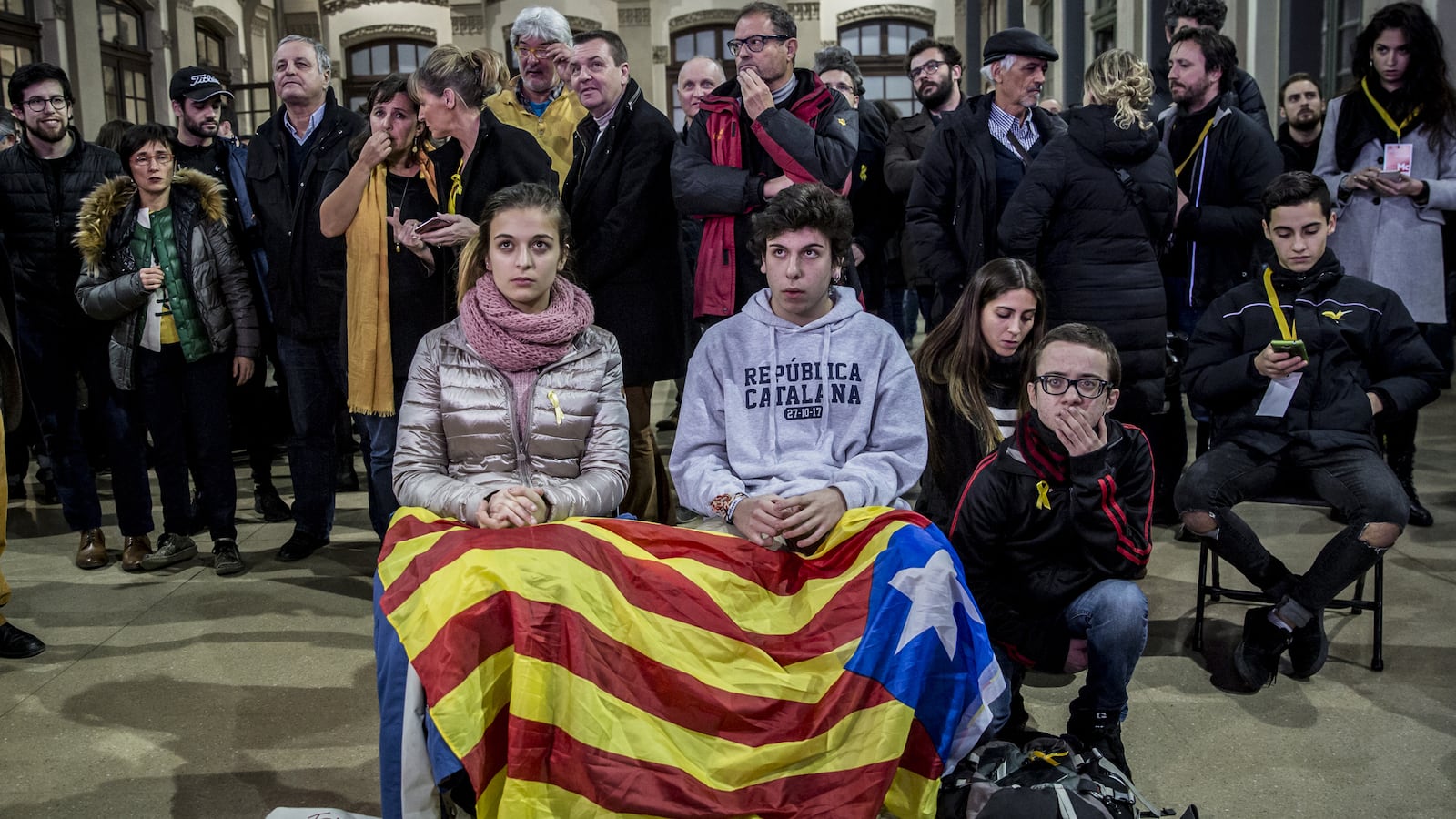BARCELONA—One could have been forgiven for thinking—hoping—that Catalonia’s independence crisis might actually fade away. At its height in October, the Catalan turmoil threatened the territorial integrity and constitutional coherence of Spain. And beyond that, it called into question fundamental ideas of what the European Union is or should be at a time when European unity and democratic values already are under assault by Brexiteers to the west and increasingly authoritarian regimes in the east (not to mention Russia).
But weeks have passed since separatist protesters banged pots and pans to send their noisy message echoing through the streets of this city. The caceroladas, as they are called here, had been replaced by a silent, at times weary, tension in a society now deeply divided over the issue of Catalan independence.
Then, just hours after the polls closed in a snap election Thursday that was meant to decide the future of region’s separatist project, it became clear that there was more trouble ahead. And the election, called by Spanish Prime Minister Mariano Rajoy in late October to put an end to the crisis, had only deepened it.
A coalition of independentista parties maintained control over the regional parliament, winning an absolute majority of 70 seats in the 135-member legislature even as those opposing independence won the popular vote. The region’s election laws are heavily weighted in favor of rural communities, which allows for a parliamentary majority despite being a popular minority. (In that sense, there’s an analogy with the American Electoral College.)
The independentista parties were able to maintain 48 percent of the vote despite a record 82 percent turnout, thus laying waste to the idea that their chances of winning would diminish if more voters went to the polls. And their victory comes even as the pro-unity Ciudadanos (Citizens) party experienced a vast surge, making it the largest popular party in the region.
Ciudadanos leader Inés Arrimadas had vowed to scuttle the independence project if given the opportunity, which she now won’t have. “For the first time, a pro-Constitution party has won in Catalonia and it’s been Ciutadans [Catalan for Ciudadanos],” said Arrimadas, who attracted 1.1 million votes. “Today one in four Catalans has trusted in this party which speaks without complexes,” by which she meant unashamedly embracing Spain’s unity.
Meanwhile, Rajoy’s Partido Popular (Popular Party) has been relegated to last place in the polls, even behind the anarchist Candidatura d’Unitat Popular (Popular Unity Candidacy).
Voters like Tresa Calbó Angrill of Barcelona, who cast her ballot in favor of the Catalan Republican Left Party, just can’t stand the imperious prime minister in Madrid. “This time I voted to screw over Rajoy,” she said. And with only three seats in the regional parliament, Rajoy has most definitely been screwed over.
The prime minister’s bitter Catalonia defeat essentially means that the knives will be out for him. More conservative members of his own party will likely complain that he did not act quickly, forcefully, and decisively to stamp out the crisis. At the same time, the Socialist Party and others will argue that his unwillingness to compromise in Catalonia has wrought nothing but division.
Rajoy’s original idea was to call snap elections to return the region to normalcy. He didn’t have much of a choice because the Catalan government, headed by former regional president, Carles Puigdemont, declared independence from Spain in October after an illegally held referendum that same month.
The crisis surrounding the Oct. 1 referendum sent tremors through Europe as Spanish police and civil guards reacted violently to the voting. Rajoy’s government, outraged by the vote, in which those who bothered to cast their ballots and made it to the polls came down massively in favor of separation from Spain. After the subsequent declaration of independence, Rajoy’s government enacted the never-before-used Article 155 of the Spanish constitution, allowing Madrid to directly administer the troubled region. By November, eight members of the regional Catalan parliament had been jailed and 13 Catalan legislators were accused of rebellion and sedition among other things.
Now that independentistas have retained their majority, Rajoy is faced with a regional government led by parties whose leadership is accused of criminal behavior. Puigdemont, who heads the Junts per Catalunya (Together for Catalonia), or JuntsxCat party, ran for office while in exile in Belgium, where he pretends to head “The Legitimate Government of Catalonia.” His former deputy, Oriol Junqueras, who heads the Catalan Republican Left party (ERC) faces charges including rebellion and sedition for his role in the independence movement. Addressing voters from Belgium, Puigdemont declared that the election meant that the “Catalan republic” had won.
Behind all of this polarizing mess is a rise of the strangest kind of populism. Both sides have mobilized their constituencies to take to the streets in well-orchestrated campaigns to express their moral indignation and call for some version of popular sovereignty.
Any party or politician seeking to promote dialogue is seen as a traitor. Independentista fury has been stoked largely by a narrative of victimization. This in turn led to a vast mobilization of unionist supporters who called for an end to the independentista project. Both groups gathered flag-waving supporters in the hundreds of thousands. The only people who were not mad as hell were the Pakistani flag vendors, who made a tidy profit off the competing nationalist protesters.
It will likely be impossible for Madrid to accept the results of the election, which supports a regional government that continues to be fundamentally opposed to its authority. Look for Catalonia’s newly elected government to remain suspended and another snap election to be held soon. Catalonia after all is not Northern Ireland during the Troubles. At least not yet.






